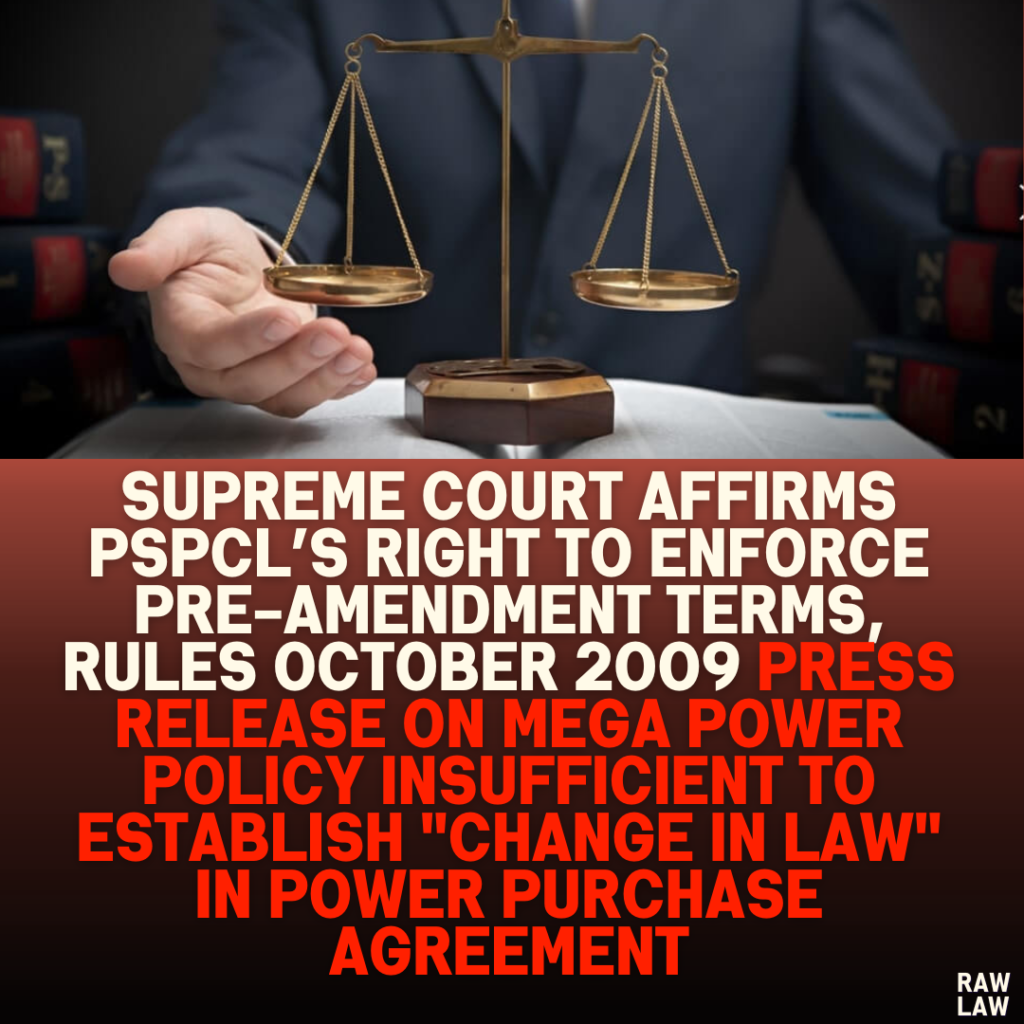Court’s Decision:
The Supreme Court upheld the order of the Appellate Tribunal for Electricity (APTEL) and the Punjab State Electricity Regulatory Commission (PSERC), determining that the Press Release issued on 1st October 2009 regarding modifications to the Mega Power Policy did not constitute a “change in law.” The Court ruled that “the press release is merely an announcement of a Cabinet proposal and does not carry the force of law,” thus requiring a formal notification under Section 25 of the Customs Act for any exemptions to take effect.
Facts of the Case:
The case involves a dispute over a power purchase agreement (PPA) signed by Nabha Power Limited (NPL) and Punjab State Power Corporation Limited (PSPCL) for the establishment of a power project. The appellant argued that the Cabinet decision communicated via a press release on 1st October 2009, which relaxed certain requirements for Mega Power Project status, altered the legal regime and should qualify as “change in law.” The 2009 Press Release eliminated conditions such as mandatory inter-state sales and revised distribution reform obligations, which the appellant claimed were factored into its bid for the project.
Issues:
- Whether the 1st October 2009 press release announcing the Cabinet decision on Mega Power Policy revisions constituted a “change in law” under the PPA.
- Whether the appellant was entitled to fiscal benefits based on the press release alone, without subsequent formal notifications.
Petitioner’s Arguments:
The petitioner contended that the press release should be regarded as “law” within the meaning of the PPA since it stemmed from a Cabinet decision, thus impacting its bid assumptions. It was argued that PSPCL had indirectly recognized this change, as demonstrated by communications related to fiscal benefits in their tariff calculations. Additionally, the petitioner asserted that by the time of bid submission on 9th October 2009, the changes in the Mega Power Policy should have been considered part of the legal framework.
Respondent’s Arguments:
The respondents argued that the press release was only a declaration of intent and lacked legal enforceability until formalized by a customs notification on 11th December 2009. They further contended that any “change in law” should be defined as legally binding provisions recognized under Section 25 of the Customs Act and that PSPCL could not be compelled to pass on fiscal benefits based on an incomplete policy declaration.
Analysis of the Law:
The Court examined the meaning of “law” as defined in the PPA, which includes statutes, regulations, notifications, and legally binding orders. According to the Court, a mere press release does not equate to a formal enactment or modification of law. It held that for an exemption under the Customs Act to have force, it must be accompanied by a gazetted notification, which occurred only on 11th December 2009.
Precedent Analysis:
The Court referred to the “Golden Rule” of contract interpretation, emphasizing that contractual terms should be interpreted in their ordinary sense unless ambiguity necessitates an alternative reading. The Court relied on the established principle from Babu Verghese v. Bar Council of Kerala and Nazir Ahmad v. King Emperor, affirming that a specified action (like granting tax exemption) must occur precisely as prescribed by statute.
Court’s Reasoning:
The Court reasoned that the press release merely announced future amendments and could not alter existing legal conditions governing Mega Power Project status. The notification dated 11th December 2009 and the revised policy dated 14th December 2009 were the first instances when the “change in law” provisions became enforceable, thereby mandating PSPCL to apply the revised fiscal benefits criteria. The Court dismissed the notion that a Cabinet decision announcement alone could bind PSPCL to honor benefits before these notifications were formally issued.
Conclusion:
The Supreme Court concluded that the appellant was not entitled to fiscal benefits based solely on the 1st October 2009 press release, as it did not have legal force. The formal “change in law” took effect only with the subsequent customs notification and policy document amendments in December 2009. The Court upheld the orders of PSERC and APTEL, affirming that PSPCL was within its rights to enforce the PPA terms under the pre-existing Mega Power Policy until the formal amendment was notified.
Implications:
This judgment emphasizes that contractual obligations under PPAs hinge on formally promulgated legal instruments, not on press releases or policy announcements without official legislative backing. The decision underscores the necessity of adhering to statutory procedures for changes in law and fiscal benefits, reaffirming the principle that law must provide certainty and legal sanctity, especially in contracts involving public utilities and state-owned corporations.




Pingback: Supreme Court Revisits LMV License Validity for Transport Vehicles Below 7500 kgs: Calls for Licensing Differentiation to Uphold Public Safety Standards - Raw Law